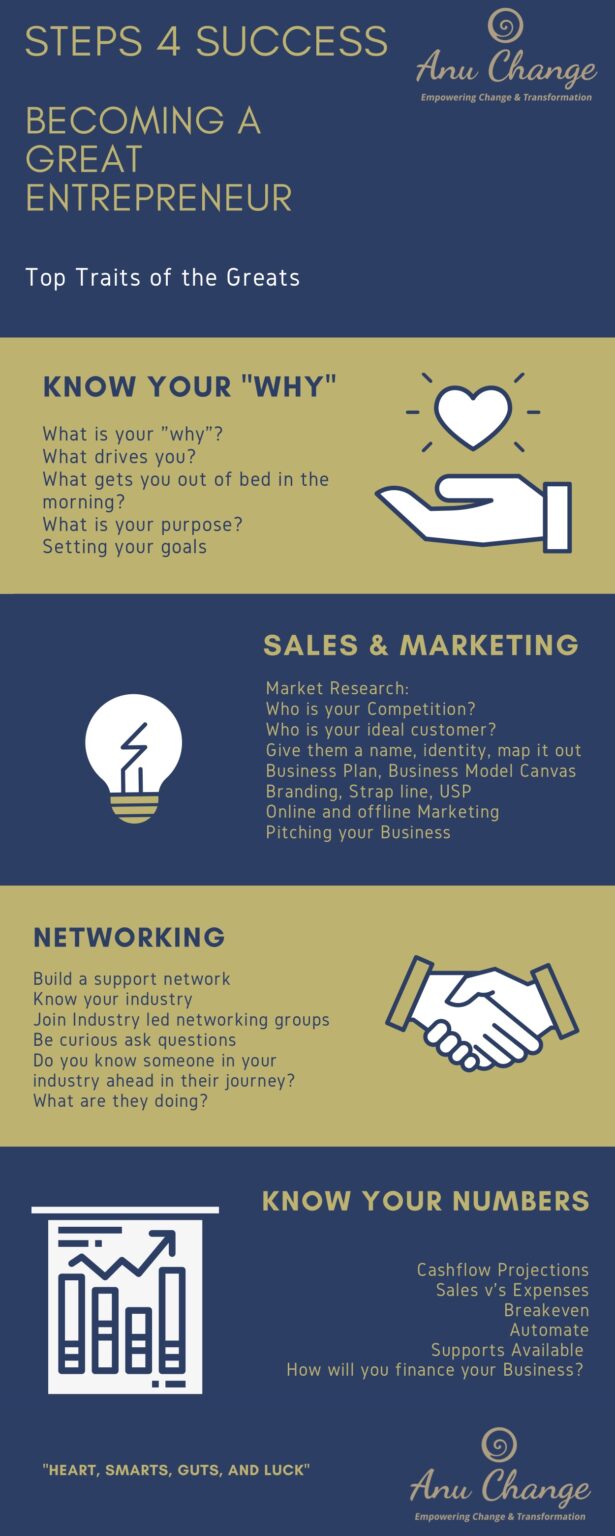
Top Tips on Starting your Own Business
1. Know yourself and your true motivational level, the amount of money you can risk, and what you’re willing to do to be successful. How far out of your comfort zone are you willing to stretch? Be passionate about what you do, you don’t have to love every aspect of your business (and you probably won’t), so it’s important that you truly deeply enjoy what you do. You’re going to devote a lot of time and energy while building it into a successful enterprise, so it’s important that you choose the right business for you. The key to success is finding needs that you can fill, that you want to fill, and that will produce enough income to build a profitable business.
2. Support – don’t do it alone Build up a supportive network whether it be a family member or friend that you can bounce ideas off, and who will listen sympathetically to the latest business emergency is invaluable. Finding a mentor in your industry will likewise offer you the chance to learn from someone who has already experienced the start-up process. Join groups with like-minded people, attend networking events, learn everything you can about your industry and what it takes to get from where you are to where you want to be. Attend industry conferences. Take training courses when they are available. Purchase courses offered by experts in your specific field. You’ll save a tremendous amount of time by learning from people who have been there before.
3. Seek professional help Just because you’re starting a business doesn’t mean you have to be an expert on everything. If you’re not an accountant or bookkeeper, hire one. If you need to write up a contract, and you’re not a Solicitor, hire one. You will waste more time and possibly money in the long run trying to do things yourself that you are not qualified to do.
4. From the outset market research is fundamental in helping you to identify your target market which will enable you determine the requirements of your specific customers and develop a market strategy/plan. It will likewise assist you to identify your competitors and how to compete effectively. Research is also effective in assessing demand for a new product or service. One of the greatest errors start-ups make is to assume a lot of people will want to buy a particular product or service, because the business owner likes the ideas or knows one or two people who want the product or service. When you’re starting a business, you need to become an expert on your industry, products, and services, if you’re not already. Joining related industry or professional associations before you start your business is a great idea and it will keep you informed on new information in the market.
5. Marketing Plan. Marketing your business idea is a fundamental aspect of starting up. Research the most cost-effective methods of marketing your business. Marketing is geared at expressing both the value of the customer and addressing their needs. Understanding how to best define your company through your branding, and developing a brand strategy, will be an integral part of defining the image of your company overall. Everything in your marketing tells a story about who you are as a company and what your company stands for. And everything you present visually, such as your company’s website, copy, ads, logo, etc. expresses that story, and the story should be compelling. If you think of it this way, all of the material you present to the world is part of your marketing. Contact Anu Change to receive your Marketing Plan template.
6. Embrace Digital Marketing. Even if you’re running a local business, you need a comprehensive digital presence. At minimum you need a professional-looking website, an email list that lets you communicate with customers and prospects on a regular basis, and presence on the social media channels that your customers frequent. While you may get many of your customers by word of mouth, referrals or networking, you still need a strong digital presence. The reason: prospective customers are likely to look you up on the web before they decide whether or not to contact you. Also, you don’t want to overlook email marketing, mobile marketing, search engine optimization, and social media marketing in your overall marketing strategy.
7. Developing your Sales How will you promote your product or service? Who and where is your target market (local, national, international)? What channels of distribution will be used? Determine your selling price and break-even point. Revenue targets, pricing and promotions. Sales is one of the most vital aspects of your business, and understanding sales management, how to hire a salesperson, and learning some negotiation tips will aide you to make your business more profitable. Additionally, understanding lead generation, which is attracting and converting potential customers into viable leads, will be a valuable tool to attract people to your business in a more organic way.
Understanding how to implement effective sales training is very important when training your sales team. Sales training should be available to your employees and be interactive and frequent. Anu Change can help train you and your staff and keep your team engaged and goal oriented: the purpose of sales training is not to merely educate your team, but also to close the deal.
8. Write a business plan.This is a key step before starting your business, as it provides you with invaluable information. Creating a business plan will allow you to better understand both operational and financial goals, providing crucial budget and marketing strategies. The main reason for doing a business plan first when you’re thinking of starting a business is that it can help you avoid pouring your time and money into something that will not succeed. A great business plan is not just an explanation of your company to your investors, it is a strategy you can implement in order to design and run your business. Be realistic with your Business Plan and with cashflow projections. Here, you can also complete different analyses, such as the PESTLE analysis and SWOT analysis. These cover political, economic, social, technological, legal and environmental factors; and the business’s strengths, weaknesses, opportunities and threats, respectively. Contact Anu Change to receive your Business Plan and Cashflow Templates.
If you’re not seeking investors or putting a huge sum of money into your business, you may not need an elaborate business plan, but you still do need a plan – one that specifies your goal – your destination – and then lays out at least a skeletal roadmap for how you’ll get to where you want to go. The plan will change as you progress and learn more about your customers and competition, but it will still help you stay focused and headed in the right directions.
9. How to Finance your Business? Seek financial support and advice from e.g. Local Government Agencies, Banks, Credit Unions, Microfinance Ireland, family support and other non-bank finance. Identify ways and types of finance available to finance your business venture e.g. overdraft, term loan, leasing, business credit card, crowdfunding? The “golden rule” is to match the type of finance (short-term or long-term) to the intended business need (short-term or long-term).
Identify all start-up and running costs associated with the business. How many staff will you need to employ? Identify your overhead costs e.g. insurance. Keep track of income and expenses keep business money separate from personal funds. Establishing and maintaining a good credit score will help and make your financial life much easier. Anu Change will advise on all financial sources that benefit you or your businesses.
10. Get Legal and taxes right the first time. It’s much more difficult and expensive to fix a mess afterwards. Does your business need to be registered? What about VAT? Will you have to have Professional Indemnity Insurance? Opening a Business Bank Account? How will the form of business ownership you choose affect your legal and tax situation? Learn what your responsibilities are before you start your business and operate accordingly. What is the Best Legal structure for you? What type of company will allow you to make the best decisions for your business? You could be a: Sole Trader, Partnership or Limited Company. Anu Change can help you decide on the right structure from the beginning.
Remember: Register your business with the Companies Registration Office (CRO). Visit www.cro.ie. Be aware of your tax obligations and register with your local Revenue office. visit www.revenue.ie. Be aware of other statutory obligations such as trading licences, planning permission, insurance, health and safety, patents, etc. and be aware of your responsibilities under employment rights legislation.
And Finally: Never stop learning and trying new things. What’s profitable now, won’t necessarily be profitable next year or 10 years from now. So, don’t let yourself fall into the “this is the way I’ve always done things” rut. Keep your eyes and ears open for new things. Are there newer or better ways to market your products and services? Are customers asking for something you’re not offering? Is there a different type of customer you should be targeting? Get answers by reading everything you can about your industry and listening to your customers.
Contact Anu Change for a Free 30 minute Consultation from a Qualified Financial Advisor to help you Start your own Business. We can also help you source the correct funding for your business, if required.




